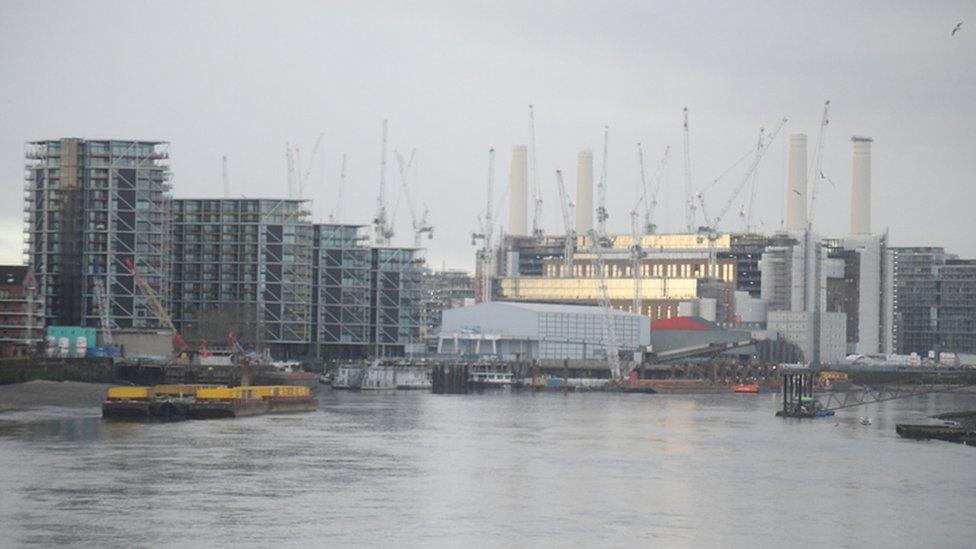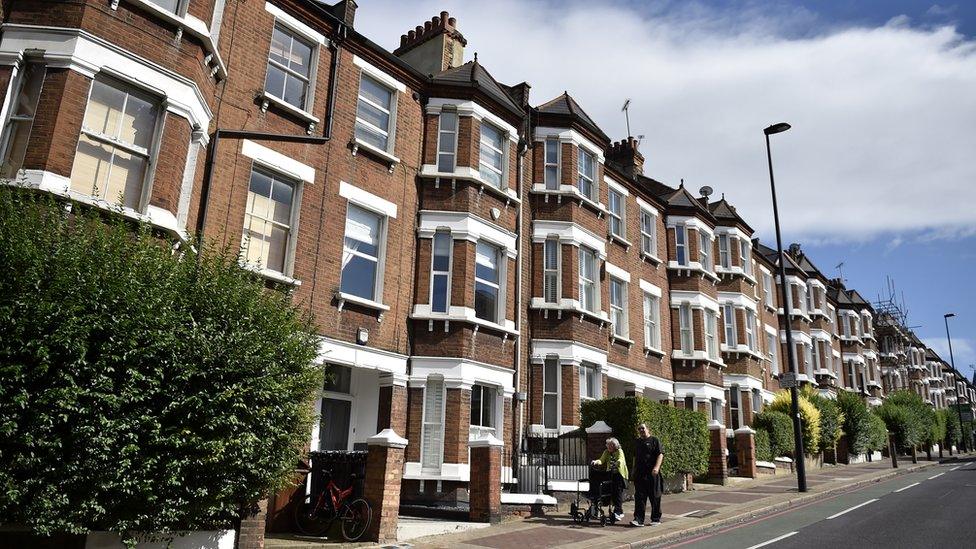Coronavirus: 'I hated my flat during lockdown'
- Published

Lockdown made Joanna Coghlan realise she wanted to move away from her flat near Battersea Power Station
When the coronavirus lockdown began, asset manager Joanna Coghlan knew she just had to get out of London and move to the countryside.
She had bought a flat in a new development at Battersea Power Station only last year. The complex included restaurants, spas and bars.
But when all those closed down because of the pandemic, the reality of her environment dawned on her.
"I spent seven weeks isolated there and realised that I absolutely hated it," she told the BBC.
"When you take away all the amenities that these developments advertise, then you realise you're just living in a glass box.
"It was a ghost town. It was just very soul-destroying living in this enormous development with no life going on."
Joanna took swift action to remedy her plight. She moved to the village of Datchworth Green in Hertfordshire, where she now has a five-bedroom house with a garden and a view overlooking a cricket pitch.
"I've got lots of space and it's fantastic," she says.
Although she and her boyfriend are currently working from home, she is still close enough to be able to go back to the office.
"I can still commute to London, so it makes it more viable if I had to go back to the daily commute, which I don't think I will any time soon," she says.
New lifestyle
There has been a surge of interest in moving to the country due to city dwellers' priorities changing during the coronavirus lockdown, estate agents have said.
Across the UK, inquiries about buying a home in a village jumped by 126% in June and July compared with the same period last year, said Rightmove. Estate agent chain Knight Frank reported similar trends.
In some cities, such as Liverpool and Edinburgh, searches more than doubled, Rightmove said.
"The lure of a new lifestyle, one that is quieter and has an abundance of beautiful countryside and more outdoor space, has led to more city dwellers choosing to become rural residents," said Miles Shipside of Rightmove.
"The most popular village moves are still within the same region the home hunters are currently in, as it's likely they'll keep their current job but may have the flexibility to commute less often and set up their working space at home."
Money not the motive
Rightmove said the number of inquiries from Liverpool residents looking for a village lifestyle had almost tripled (275%) compared with a year earlier.
In Edinburgh, village inquiries are up 205% and in Birmingham they have increased by 186%.
The website said some urban home owners may have benefited from strong house price growth over the years, making it possible to now trade up and out to the country.
But money does not appear to be the main motive for moving, as average asking prices in villages are often more expensive than in cities.
In many cases, the searches show house hunters are looking at villages within commuting distance to their current city, suggesting people are being drawn to the appeal of a quieter way of life.
Mark Rimell, director in Strutt & Parker's country house department, said: "A slower pace of life, outdoor space and tight knit communities come hand in hand with village living - something many have come to appreciate in recent months - and have enduring appeal."
Working from home shift
Rightmove's research was released as a separate survey from Barclays Mortgages found that the South West of England, with its rural and coastal communities, is a particularly desirable location for those currently in Birmingham, Nottingham, London, and Manchester.
Barclays Mortgages found popular reasons for people wanting to relocate include a bigger garden, being closer to essential services, living where they can exercise easily, being nearer to relatives, and a stronger local community.
Dr Peter Brooks, chief behavioural scientist at Barclays, said: "More outside space and the benefits of being closer to friends and family are high on the 'must have' list for many movers.
"As working from home becomes more commonplace moving cross-country looks to be more achievable for many as there is less of a need to be within a short commute to the office."
- Published4 August 2020

- Published31 July 2020
